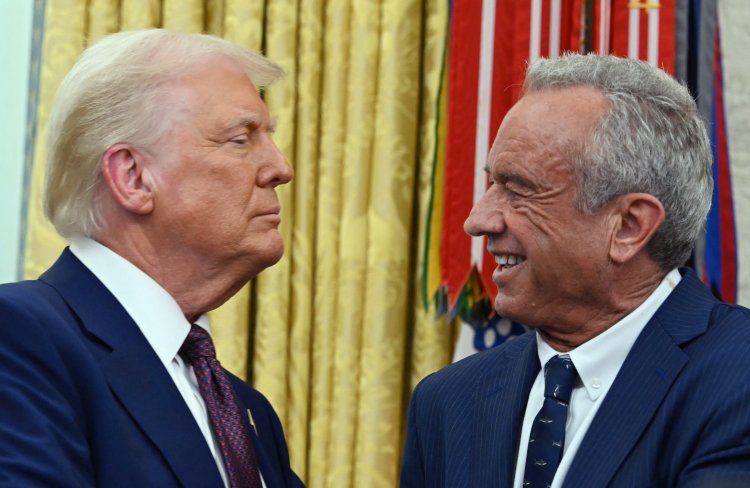RFK Jr. deviates from his usual path, to Trump's delight.
Robert F. Kennedy Jr. has significantly broadened his influence, extending far beyond the typical role of a health secretary.

Senior aides believe Kennedy’s “Make America Healthy Again” (MAHA) supporters played a significant role in securing the popular vote for President Donald Trump last November. They see keeping these supporters engaged as essential for the GOP to maintain its power in the upcoming midterms, according to multiple Trump aides and advisors who spoke on the condition of anonymity.
This support has allowed Kennedy, now a presidential candidate turned senior health official, to influence a broad spectrum of policy priorities across the government, despite some discomfort from officials in other departments who feel his influence encroaches on their responsibilities.
“Midterm success, in a large way, depends on MAHA success,” noted one Trump adviser, who requested anonymity due to sensitivities around internal discussions. “This is about President Trump, and this is about the House and the Senate.”
Kennedy, who boasts a dedicated following and polling support that reached 15 percent before he withdrew from the 2024 race to align with Trump, is already pushing for significant reforms within the Agriculture Department. He has also spearheaded initiatives typically associated with the Environmental Protection Agency and has characterized his role as one focused on “anything I need to do to make America healthy again.”
His expansive approach has allowed Kennedy to redefine a Cabinet position usually held by less prominent figures, increasing his political stature and transforming the former Democrat into a pivotal figure for Trump’s domestic objectives.
The White House is encouraging this high-profile strategy, relying on polling that indicates Kennedy is one of the more popular members of the Cabinet. They believe his MAHA agenda will appeal to diverse voter demographics, particularly those dissatisfied with government health officials post-Covid-19.
“Everyone sees a need to deliver for those MAHA voters, because it’s a new coalition,” explained a White House official, indicating that Kennedy’s supporters tend to be younger and more female than the traditional Republican demographic. “You could actually close the gender gap and maintain the margins Trump got with young people.”
Driven by his ongoing interests in food, wellness, and environmental toxins, Kennedy is advocating for the removal of soda and unhealthy foods from the food stamp program, asserting that he would expedite approval for such requests, even though these areas fall under the USDA’s jurisdiction. His skepticism regarding fluoridated water has led him to promote the EPA’s reevaluation of national fluoride standards.
Kennedy, who leads the Department of Health and Human Services (HHS), has indicated plans to engage with various pressing issues, including nutrition programs, pesticide regulation, and technology use in schools.
“MAHA represents a holistic approach to health, which requires a holistic approach from government,” stated Roger Severino, vice president of domestic policy at the Heritage Foundation and a former senior Trump health official. “But you need to have a center of gravity, and that center of gravity is RFK Jr.”
Kennedy’s activities have made him one of Trump’s most visible Cabinet members. This month alone, he has participated in events across seven states, held two press conferences in Washington, and conducted three television interviews, usually with Trump.
“Secretary Kennedy is both trusted and empowered by President Trump to deliver on his directive to get to the bottom of America’s chronic disease epidemic,” White House spokesman Kush Desai affirmed, calling it a shared priority “across the entire Trump administration.”
However, Kennedy’s extensive mandate has caused some dissent within the administration, with officials expressing concerns that his ambitions exceed his expertise. A former trial lawyer known for his anti-vaccine stance, Kennedy has no prior governmental experience and limited policymaking knowledge.
He is directing a significant government department, leading to mixed results so far. Initiatives like restricting food dyes and examining the infant formula sector have faced scrutiny in light of deep staffing reductions and a rising measles outbreak. His persistent doubts about vaccines are seen by some Trump allies as a troubling distraction, as high favorability ratings come with equally high disapproval ratings.
A recent survey indicated Kennedy's favorability rating is slightly below water, which is still better than some other Trump officials; another poll revealed community reluctance to support his agenda if it would increase food prices. Internally, there are concerns about the effectiveness of Kennedy’s office, prompting the White House to manage HHS activities more closely.
Kennedy's actions have also led to messaging complications. Recently, he criticized plans to vaccinate poultry against bird flu, directly contradicting a program announced by USDA Secretary Brooke Rollins, which included funding for vaccine development. Following his comments, Rollins retracted her support for the vaccine initiative, even though USDA plans to allocate $100 million for research on the matter.
Kennedy also took the lead on food stamp reforms by encouraging states to propose restrictions on soda and junk foods, promising quick approval, which upset USDA officials still working through the legal and practical implications of modifying the Supplemental Nutrition Assistance Program.
“Why not focus on Medicaid?” questioned one administration official, requesting anonymity to discuss internal dynamics. “He has the biggest welfare program literally sitting in his agency … they’re ignoring the behemoth. It’s just baffling the way they’re continuing to talk SNAP.”
In response, HHS spokesman Andrew Nixon emphasized that Kennedy’s mission “is not confined to the walls of HHS — it’s tied to what we eat, how we live, what we’re exposed to, and how our children grow up.”
“The Secretary works closely with fellow Cabinet officials and values collaboration,” Nixon added. “Interagency coordination is normal in any administration pursuing real change.”
Rollins has minimized divisions within the administration and has made a point to align closely with Kennedy on MAHA issues, noting, “we don’t agree on everything, but we agree on most things.” USDA spokesman Seth Christensen reiterated that Rollins and Kennedy are “fully aligned.”
As the administration prioritizes MAHA initiatives, Trump’s domestic achievements will increasingly hinge on Kennedy’s capability to bring about significant improvements in Americans’ health, food, and environment over the next year and a half.
The administration has highlighted state-level MAHA initiatives as successes, crediting Kennedy and Trump’s backing for their progress. However, implementing substantial national policies to reduce chronic disease will likely be a protracted process, often requiring congressional approval or lengthy rulemaking.
The effort may encounter increased resistance as it addresses larger challenges. Well-funded agricultural groups and certain Republican lawmakers are already preparing for conflicts over the widely employed pesticide glyphosate, which Kennedy has criticized as detrimental to public health and previously litigated over, alleging it caused cancer in a man.
This issue has rallied Kennedy’s supporters, with one MAHA-associated organization promoting a petition aimed at urging the EPA to ban several pesticides.
However, in a letter to Kennedy, Rollins, and EPA Administrator Lee Zeldin, nearly 80 GOP lawmakers defended the safety of pesticides and cautioned against pursuing policies that could harm health, the economy, or food security under the pretense of improving health. Zeldin, for his part, has committed to deferring to scientific assessments from his agency.
“It’s inevitable that the people in MAHA will come into conflict with Lee Zeldin and the EPA,” remarked JW Glass, an EPA policy specialist at the Center for Biological Diversity.
Ultimately, for Trump allies, tangible outcomes are more crucial than the specifics. Kennedy has been granted the authority to explore nearly any path that may enhance Americans’ health. Now, he faces time constraints to deliver measurable results.
“If we don’t have measurable diminishment of obesity in this country, if we don’t have measurable decreases in other factors of chronic disease, what does the president say?” questioned a Trump adviser. “There have to be wins that he can talk about.”
Thomas Evans for TROIB News












